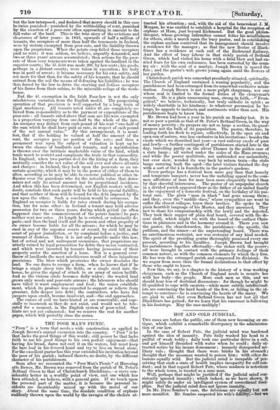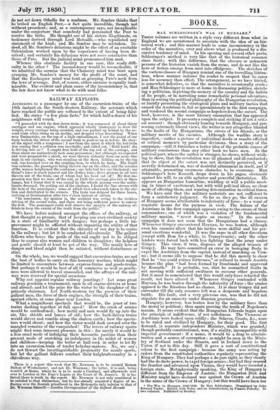HOT AND COLD J UDICIAL.
Two cases are before the public, one of them now becoming an an- tique, which exhibit a remarkable discrepancy in the administra- tion of our law.
In the case of Robert Pate, the judicial mind was hardened against the idea of insanity. Pate daily washed his head in a pailful of weak toddy ; daily took one particular drive in a cab, and got himself drenched with water when he could ; daily at- tracted notice by his insane demeanour ; insanely disregarded mi- litary rule ; thought that there were bricks in his stomach ; thought that the messman wanted to poison him ; with other de- lusions equally wild. But the judicial mind is incapable of per- ceiving that such a state of health implies incapacity for self-con- duct ; and in that regard Robert Pate, whose madness is notorious to the whole town, is treated as a sane man.
Well, perhaps that might be justified if the judicial mind con- sistently ignored insanity; which indeed, as we have shown, it might safely do under an intelligent system of correctional disci- pline. But the judicial mind does not ignore insanity.
In Mr. Dyee Sombre's case, the delusions are equally but not more manifest. Mr. Sombre suspected his wife's fidelity,—but we do not set down Othello for a madman. Mr. Sombre thinks that he bribed an English Peer,—a fact quite incredible, though not without precedent; and, as a contemporary says, not inexplicable under the conjecture that somebody had personated the Peer to receive the bribe. He thought one of his sisters illegitimate, on testimony derived through Lord Metcalfe,—who repudiated any statement of the kind; and Mr. Sombre may be mistaken. In- deed, all Mr. Sombre's delusions might be the effect of an excitable Orientalism worked upon by the experience of having been de- ceived; and certainly his delusions were not more conclusive than those of Pate. But the judicial mind pronounced him mad,.
Whence this obstinate facility in one case, this ready diffi- culty in. tlte other ? The inconsistency would be reconcileible, if we admitted the surmise that the Chancery mind was bent upon grasping Mr. Sombre's money for the profit of the court, and that the Exchequer mind was bent on grasping Pate's neck from the love of revenge. But, of course, either surmise is equally inad- missible. The evident and plain cause of the inconsistency is, that the law does not know what to do with mad folks.



























 Previous page
Previous page